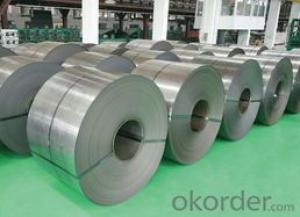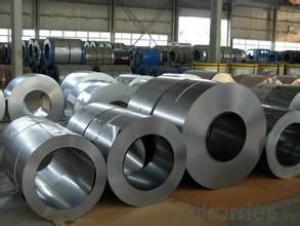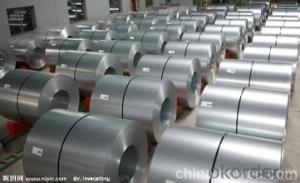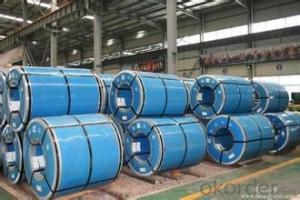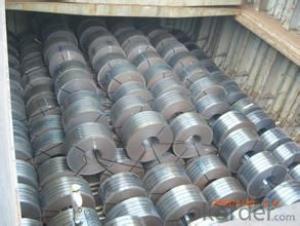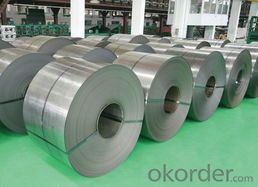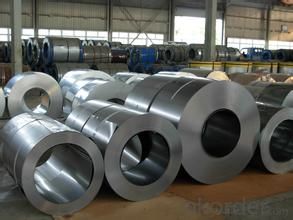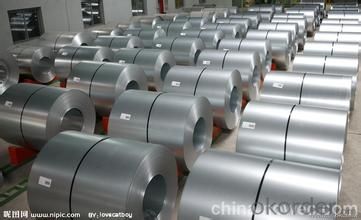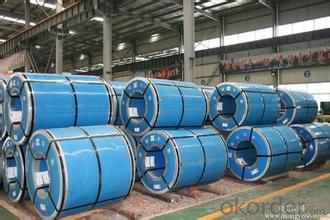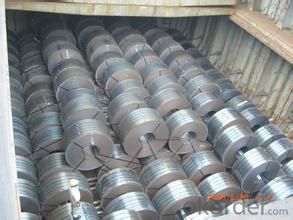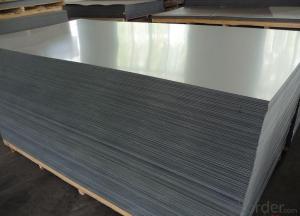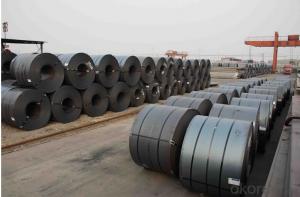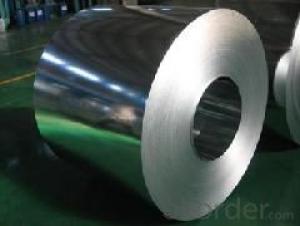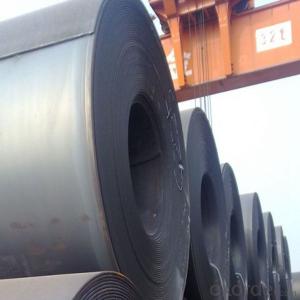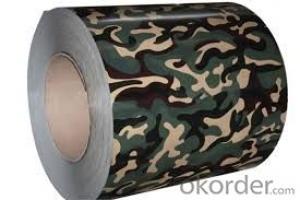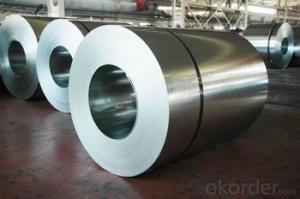Cold rolled steel coil / sheet in good quality
- Loading Port:
- China main port
- Payment Terms:
- TT OR LC
- Min Order Qty:
- 50 m.t.
- Supply Capability:
- 5000000 m.t./month
OKorder Service Pledge
OKorder Financial Service
You Might Also Like
The raw material of cold rolled steel coil/sheet is high quality hot rolled product, and after pickling, kinds of new technology and new process of global cold rolling production have been applied. Therefore the manufacturing, home appliance, automobile etc. Quality of the goods could be guaranteed. The finished product has a variety of excellent capabilities, such as continuous rolling, degreasing, annealing, skin pass, slitting and cut to length line etc. Along with it many rocessing capability and smooth, flat surface. It’s widely used in outdoor and interior decoration, furnishing
Specification
Product Name | Cold Rolled Sheet Coil |
Material | SPCC/SPCD/SPCE/DC01/ST12/ ST14/SPCD/DC03/DC04 ect. |
Grade Standard | JIS G3302, EN10142, ASTM653, ASTM95 |
Thickness | 0.15-3.5mm |
Width | 600mm-1500mm |
Coil ID | 508-610mm |
Coil OD | max 1500mm |
Weight | 3-10 Tons |
Tolerance | Thickness tolerance:+/-0.02mm; Width tolerance:+/-5mm |
Surface | No-skin passed or Skin passed, Tensile leveled |
Surface Treatment | Chromate/Unchromate passivation, fingerprint resistant treatment, oiled/unoiled |
Annual Output | 350,000MT |
Application | Construction, hardware, home applicances, interior decoration |
Characteristics
1. Commercial quality suitable for bending fabrication and simple forming; this is the type in greatest demand.
2. Drawing quality second only to that of SPCEN. Excellent uniformity.
3. Deep-drawing quality.With metallurgically controlled grain size, it retains its beautiful finish even after being deep-drawn.
4. Extra-low-carbon steel sheets with highest workability
- Q: what is magnetic steel used for and if it can be used for producing kitchenwares utenils like stainless steel basines,mugs and bowls.
- Magnetic steel rusts. That's why kitchenware is often made out of stainless. You can't turn magnetic steel into stainless, sorry. Metalurgy is a complicated subject, and is all about different alloys. It's far too involved to explain in a few paragraphs here, but no, they're not interchangeable in this case unless you want to produce kitchenware that rusts.
- Q: What are the different types of steel coil finishing machines?
- There are several different types of steel coil finishing machines, including slitting machines, cut-to-length machines, and coil coating machines. Slitting machines are used to cut steel coils into narrower strips, while cut-to-length machines are used to cut steel coils into specific lengths. Coil coating machines are used to apply a protective coating or finish to the surface of steel coils.
- Q: Also, what is the top best slow cooker that is 100% stainless steel? Thank you!
- You do not want 100% stainless steel cookware, because it's a poor conductor of heat. All high quality stainless cookware is layered with stainless steel only on the exterior and interior surfaces, while having at least an internal heat spreading core of aluminum or copper. Not all stainless steel is sufficiently ferrous (magnetic) to work with electric inductive cooktops, so some stainless cookware adds an additional layer of ferrous steel in addition to the thermal cores. You also wouldn't want a slow cooker that's 100% stainless steel, because the uneven heating would cause food to burn more quickly. They are usually made of ceramic stoneware for a reason, even heating. Besides, a stainless pressure cooker (with alum/copper) core can in less than an hour everything a slow cooker does in 3+ hours, with better flavor, color, and nutritional content. By the way, the Prestige stainless cookware isn't 100% stainless, of course, and that's a GOOD thing.
- Q: If steel can rust with saltwater... then why are ships made of steel? can't we just use other metals like aluminium etc?
- Steel became the medium of construction almost be accident. The Royal Navy began to coat its wooden ships with a coating of steel to give them added protection in battle. They were known as the Iron Clads. From this it was a small step by such people as Brunnel to start construction in iron, then various other steels. The Great Eastern is a classic example. Over the last one hundred years the main improvement is in welding rather than a riveted construction. Improvements in steel have lead to a reduction in the scantlings and through this a reduction I the weight of the ship which has allowed for an increase in the carrying capacity. There always have been specialist ships built with alternative materials. Aluminium, wood, concrete and GRP. GRP. Also it must be remembered that there has been great advances in steel, from the early days of cast iron.
- Q: How are steel coils used in the production of automotive parts?
- Steel coils are used in the production of automotive parts as they are processed and shaped into various components such as body panels, chassis, and structural parts. These coils are typically unrolled, cut, and formed into the desired shape using specialized machinery. The flexibility, strength, and durability of steel make it an ideal material for manufacturing automotive parts, ensuring safety and reliability in the finished products.
- Q: How is the quality of steel coils determined?
- The quality of steel coils is determined through various tests and inspections, including visual examination, dimensional inspection, mechanical properties testing, and chemical analysis. These assessments help identify defects, such as surface imperfections, cracks, or variations in thickness and width, as well as ensure the desired mechanical properties and chemical composition of the steel.
- Q: What are the common coil weight and width combinations available for steel coils?
- The common coil weight and width combinations available for steel coils vary depending on the specific industry and application. However, some commonly available coil weight and width combinations for steel coils include weights ranging from 1 to 40 metric tons and widths ranging from 600 to 2,000 millimeters. These combinations can be tailored to meet the requirements of different manufacturing processes and end-user needs.
- Q: I'm analysing horse stirrups and would like to know the disadvantages to stainless steel? - thanks
- Stainless Steel has more advantages than disadvantages. But u asked for disadvantages so they r as follows i've given common disadvantages more can be found on Google. Disadvantages of Stainless Steel: Stainless steel tends to scratch and dent. Food, grease and fingerprints show very clearly on stainless steel, making frequent wiping and cleaning a necessity. High initial cost Difficult to fabricate, or in other words, it is not as malleable as other metals, say iron, and hence if not fabricated properly, results in costly re-work. Difficult to weld High cost of polishing etc. i.e. adding finishing touches for the market. there are advantages more than disadvantages. But u asked for disadvantages that's why i have given only disadvantages of stainless steel Hope what u want u got.
- Q: What are the safety considerations when handling steel coils?
- When handling steel coils, it is important to consider safety measures to prevent accidents or injuries. Some key safety considerations include: 1. Proper training: All personnel involved in handling steel coils should receive adequate training to understand the risks associated with the task and learn proper handling techniques. 2. Personal protective equipment (PPE): Workers should wear appropriate PPE such as gloves, safety boots, and eye protection to protect against cuts, punctures, or other injuries. 3. Load capacity and stability: Ensuring that lifting equipment and machinery used for handling steel coils have the necessary load capacity and stability is crucial to prevent accidents or equipment failures. 4. Proper lifting techniques: Using correct lifting techniques, such as bending the knees and lifting with the legs rather than the back, helps to minimize the risk of strains or back injuries. 5. Secure storage: Steel coils should be stored in a secure and organized manner, with proper blocking, bracing, or racking systems in place to prevent them from shifting or falling. 6. Inspection and maintenance: Regular inspection of lifting equipment, hooks, slings, and other accessories is essential to identify any signs of wear or damage that could compromise safety. 7. Communication and coordination: Establishing clear communication protocols and coordination among workers involved in handling steel coils can help prevent accidents, especially in areas with limited visibility or restricted access. 8. Hazard identification and mitigation: Identifying potential hazards such as sharp edges, loose straps, or uneven surfaces, and taking appropriate measures to mitigate these risks, is vital to ensure safe handling practices. By considering these safety measures, the risk of accidents or injuries associated with handling steel coils can be significantly reduced.
- Q: What brand steel tapes are of good quality?
- Durable durable depends on your personal use frequency, the high frequency nature is easy to wear, resulting in scale. If you like fuzzy units if buying tape need verification it is best to buy the Great Wall Seiko goods, because the time to measure the number of verification inspection of steel tape, basically qualified rate of the Great Wall Seiko steel tape can reach one hundred percent.
Send your message to us
Cold rolled steel coil / sheet in good quality
- Loading Port:
- China main port
- Payment Terms:
- TT OR LC
- Min Order Qty:
- 50 m.t.
- Supply Capability:
- 5000000 m.t./month
OKorder Service Pledge
OKorder Financial Service
Similar products
Hot products
Hot Searches
Related keywords
